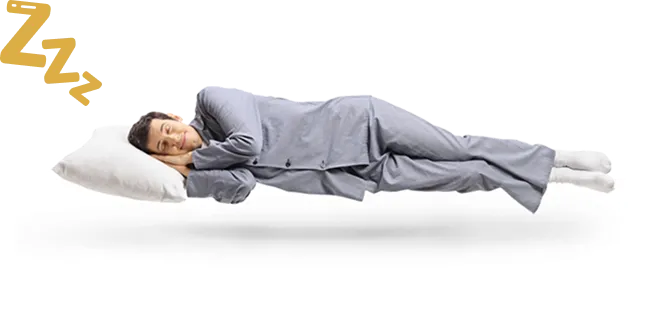Mattress Science
November 2023What is winter fatigue and how can you alleviate the symptoms?

What are the symptoms of winter fatigue?
As the name suggests, winter fatigue refers to a persistent feeling of tiredness or lack of energy that affects people during the winter months.
But of course, being tired doesn’t necessarily mean you have winter fatigue. After all, winter can be a busy time, full of celebrations and social plans – all bound to leave you feeling a little depleted. And it’s also a time when we’re more prone to catch colds and other viruses that leave us feeling under the weather.
So how can you tell if you’re actually struggling with winter fatigue? Well, there’s actually a surprising range of symptoms that winter fatigue can cause, and which can help you identify if you might be experiencing it. These include:
- Lack of energy. This is the most immediate and obvious symptom, but it’s more than just simple tiredness that comes from lack of sleep. You may feel physically sluggish and more easily fatigued throughout the day.
- Low mood. Winter fatigue can also impact your general mood, making you more likely to feel sad or despondent for no particular reason. Of course, this is compounded by feelings of fatigue, which can make it harder to do the things you enjoy.
- Overeating. Winter is notoriously a time of overindulgence, but winter fatigue can also be a factor in your eating habits getting worse during this period. It can lead to cravings for heavy, starchy foods and a tendency to eat larger meals.
- Difficulty in concentrating. Winter is a great time for staying cosy at home and putting time into some of your favourite hobbies. But you may find that winter fatigue makes this harder than you might like. It can lead to difficulties in paying attention for prolonged periods, making your plans to get some reading done or catch up on shows you’ve missed more difficult to fulfil.
As you can see, taken as a whole the various symptoms of winter fatigue combine into something that can be quite unpleasant to experience. It can put a real dampener on your winter plans and leave you feeling like you’re missing out on the best the season has to offer.
But before we look at how you can alleviate some of these symptoms, let’s dig into what causes them in the first place.
What causes winter fatigue?
Just as winter fatigue has a range of symptoms, it also has a number of different causes. Some of these are related to lifestyle changes that we often experience during the winter months, and others are tied to physiological changes in our bodies. The key causes are:
- Increased melatonin. Melatonin is known as the “sleep hormone” because it helps to regulate our circadian rhythm. Our bodies produce melatonin when it’s dark, which increases our feelings of sleepiness. In winter, when it’s darker for longer and often remains fairly dark throughout the day, our bodies produce more melatonin, leading to stronger feelings of sleepiness all day long.
- Lack of Vitamin D. Vitamin D is an essential nutrient in our bodies, helping to boost our mood and energy levels. But Vitamin D is only produced in the body when our skin is exposed to sunlight – something that can be very difficult during the winter.
- Stress. The winter period can be a busy and challenging time. For many of us, it means lots of presents to buy and celebrations to attend, with all the financial pressure this entails. Stress and tension can lead to greater fatigue and low mood, key symptoms of winter fatigue.
- Inactivity. However strong our habits, and however committed to our exercise routine we might be, the winter months can still prove difficult. Getting up and out in the morning to exercise is a lot harder when it’s freezing cold and pitch black outside. But if your exercise levels drop, your energy will likely follow suit.
So, now you know the causes and symptoms of winter fatigue. But the most important question is: how do you treat it?

How to alleviate the symptoms of winter fatigue
- Increased daylight exposure
As we’ve said, lack of exposure to direct sunlight is a major cause of winter fatigue. Both of the hormonal imbalances that lead to winter fatigue are caused by the darkness of the winter months, so treating it involves trying to reverse this process.
On the one hand, this can be as simple as trying to ensure you get outside during the daylight hours. Depending on your working schedule, this may prove a challenge – it might be necessary to schedule a brief walk during your lunch break, for instance. But even just ten minutes of sunlight is enough to get a day’s worth of Vitamin D.
If you’re struggling to get the sunlight you need, you might consider investing in a light box. These lamps use specially designed bulbs to simulate daylight – unfortunately, your everyday lamps won’t work.
2. Exercise
Yes, it’s not always what we want to hear, but it’s true: exercise will help tackle winter fatigue. It’ll boost your energy levels, reduce fatigue, tackle stress – more or less everything you need to alleviate the key symptoms. And if you exercise outdoors, it’s a great way to get more daylight, too!
Of course, this is easier said than done. When it’s dark outside and lashing down with rain, the thought of going out for a run or even driving to the gym can prove immensely off putting. If you’re finding it difficult, consider adopting a form of exercise you can do at home – yoga can be a great choice for a simple, low-impact workout without leaving the comfort of the house.
3. Diet
There are plenty of good reasons to indulge over the winter period, but if you want to alleviate your winter fatigue, you may want to practise moderation.
Generally speaking, a diet higher in fat and sugar will make you feel more fatigued and lacking in energy throughout the day. If you are struggling with low energy and tiredness, trying to ensure you eat a balanced diet with plenty of fruits and vegetables can make a big difference.
Of course, that doesn’t mean you don’t get to enjoy some festive treats. As the saying goes: everything in moderation – including moderation!
 4. Sleep hygiene
4. Sleep hygiene
It’s an obvious point but it bears repeating – good quality sleep is essential to reducing your feelings of fatigue.
But what people often don’t understand is just how many different factors go into the quality of your sleep – from maintaining a good routine to avoiding screen use in the hours before sleep.
For a full breakdown, read our blog post on the topic. We’ve also put together a handy list of apps that can help you improve your sleep quality.
And one big contributor to sleep quality that is often overlooked is your mattress. If your mattress is poor quality, poorly maintained, or just not suited to the way you sleep, you won’t be waking up feeling refreshed in the morning.
Let’s look a bit more closely at how your mattress could be contributing to your winter fatigue – and how you can solve the issue.
Is your mattress contributing to your winter fatigue?
Many of us don’t think as much as we should about the impact our choice of mattress can have on the quality of our sleep. But if you’re struggling with winter fatigue, anything that’s impacting your sleep will only make matters worse. That means it’s imperative you solve any mattress-related issues you might be facing.
There are three key factors you need to consider when it comes to assessing if your mattress is impacting your sleep:
- Support. Is your mattress providing the right level of support for your body? If your mattress is too soft or too firm, you won’t be sleeping as well as you should. The level of support you need will depend on your weight, your sleeping position, and any specific health issues you might have.
- Cleanliness and hygiene. Over time, your mattress can develop bugs, mould, or other unpleasant and unwelcome additions. This is especially true if you don’t maintain your mattress properly. All of these things can disturb the quality of your sleep, impacting your breathing and adding unnecessary discomfort.
- Noisiness. While your bed frame is often the source of those annoying squeaks you might hear when turning over in the night, your mattress can also contribute. This is especially true if your mattress is older, or is made from poor quality materials.
As you can see, there are many reasons why your mattress might be impacting your sleep quality. If you are struggling with winter fatigue, or believe that your mattress could be the reason you’re losing sleep, consider buying yourself a Christmas present that could help tackle your tiredness – a brand-new mattress!
If you think it’s about time you updated your old, worn out mattress but don’t have a clue where to start looking for a new one, read our “how to choose a mattress guide” which will tell you everything you need to know when looking for a new mattress.
Beat winter fatigue with John Ryan
If you want to make the most of the winter season, then you need to take a proactive approach to fighting winter fatigue. And that includes making sure you’re getting the quality of sleep you deserve.
Here at John Ryan By Design, we’re committed to helping you find the right mattress for your needs. If you’re not sure where to start, check out our FAQs for more information. Or, for free advice just give us a call on 0161 437 4419.

Dreaming of the perfect nights sleep?

Ask us a question
There are over 6000 questions and answers submitted by you on all questions about mattresses and bed problems. Enter a keyword such as Vi Spring, John Lewis beds, bad back or Memory Foam and see if your question has already been answered.
If you can’t find an answer in knowledge hub, ask a new question. We aim to respond to all questions within one working day.
Newsletter
Enter your email to join our newsletter. We’ll send you occasional news and mattress expertise.
